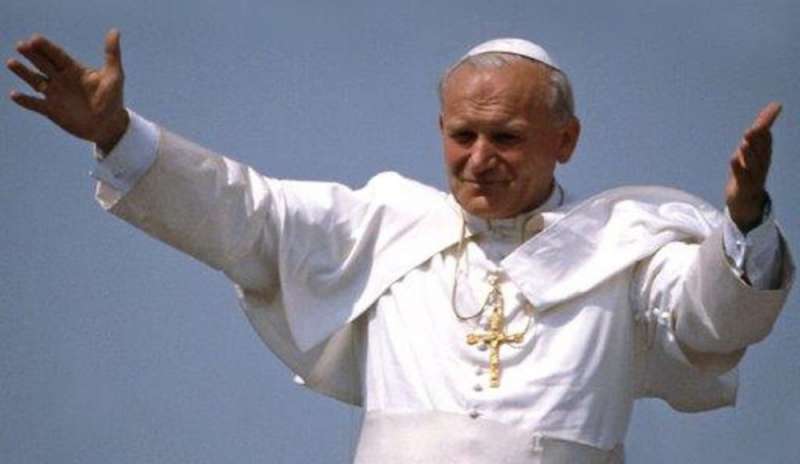What Pope Saint John Paul II said about the "structures of sin"

When any part of the body suffers, we all suffer.
In the pastoral letter Open Wide Our Hearts, the USCCB reviews the history of oppression of people based on ethnicity and race in America and states quite clearly: "The roots of racism have extended deep into the soil of our society" .
We, as conservative Christians who believe in the dignity of all human persons, should openly recognize the problem of racism in our nation and oppose it. We should see the injustice of a person who claims his race or ethnicity as superior to that of others, the sinfulness of individuals and groups who act on these views and how these views have affected our laws and the way it works. our society.
We Catholics should be at the forefront of the fight to end racism, instead of giving the front line to people who have been influenced more by various ideologies than by the Gospel of Jesus Christ. We use the language the Church already has to talk about sins like racism. We already have lessons on how we have a responsibility to end it.
The Church in her tradition and in the Catechism speaks of "structures of sin" and of "social sin". The Catechism (1869) states: “Sins give rise to situations and social institutions contrary to divine goodness. The "structures of sin" are the expression and effect of personal sins. They lead their victims to do evil in turn. In an analogous sense, they constitute a "social sin" ".
Pope Saint John Paul II, in his apostolic exhortation Reconciliatio et Paenitentia, defines social sin - or "structures of sin" as he calls it in the encyclical Sollicitudo Rei Socialis - in different ways.
First, he explains that "by virtue of human solidarity which is as mysterious and intangible as it is real and concrete, the sin of each individual in some way affects others". In this understanding, just as our good deeds build the Church and the world, every single sin has repercussions that harm the whole Church and all human persons.
The second definition of social sin includes "a direct attack on one's neighbor ... against one's brother or sister". This includes "every sin against the rights of the human person". This type of social sin can happen between "the individual against the community or from the community against the individual".
The third meaning that John Paul II gives "refers to the relationships between the various human communities" which "are not always in accordance with God's plan, who wants there to be justice in the world and freedom and peace between individuals, groups and peoples. . These types of social sin include struggles between different classes or other groups within the same nation.
John Paul II recognizes that identifying the responsibility of the generalized structures of sins is complex, because these acts within a society “almost always become anonymous, just as their causes are complex and not always identifiable”. But he, with the Church, appeals to the individual conscience, since this collective behavior is "the result of the accumulation and concentration of many personal sins". The structures of sin are not sins committed by a society, but a worldview that is found in a society that affects its members. But it is the individuals who act.
He also adds:
This is the case with the very personal sins of those who cause or sustain evil or who exploit it; of those who are able to avoid, eliminate or at least limit certain social evils, but who do not do it out of laziness, fear or conspiracy of silence, out of secret complicity or indifference; of those who take refuge in the alleged impossibility of changing the world and also of those who evade the effort and sacrifice required, producing specious reasons of a higher order. The real responsibility, therefore, falls on individuals.
Thus, while the structures of a society seem to anonymously cause social sins of injustice, individuals in society are responsible for trying to change these unjust structures. What begins as the personal sin of individuals with influence in a society leads to structures of sin. It leads others to commit the same sin or another, in their own free will. When this is incorporated into a society, it becomes a social sin.
If we believe the truth that individual sins affect the whole body, then when any part of the body suffers, we all suffer. This is the case of the Church, but also of the entire human race. Human persons made in the image of God have suffered because others believe the lie that the color of a person's skin determines his worth. If we don't fight against the social sin of racism because of what John Paul II called indifference, laziness, fear, secret complicity or the plot of silence, then it becomes our personal sin too.
Christ has modeled for us how to reach the oppressed. He spoke for them. He healed them. It is only his love that can bring healing to our nation. As members of his body in the Church, we are called to do his work on earth. Now is the time to step forward as Catholics and share the truth about the worth of every human person. We must be very considerate of the oppressed. We must leave 99, like the Good Shepherd in the parable, and look for the one who suffers.
Now that we've seen and called the social sin of racism, let's do something about it. Study the history. Hear the stories of those who have suffered. Find out how to help them. Talk about racism as an evil in our homes and with our families. Get to know people of different ethnic backgrounds. Look at the beautiful universality of the Church. And above all we claim the realization of justice in our world as a Christian movement.